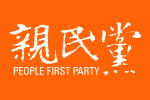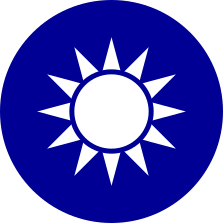People First Party (Taiwan)
The People First Party (PFP, Chinese: 親民黨; pinyin: Qīnmín Dǎng; Pe̍h-ōe-jī: Chhin-bîn-tóng) is a liberal-conservative political party in Taiwan (Republic of China).
 PFP Logo | |
| Leader | James Soong |
| Founded | 31 March 2000 |
| Headquarters | Taipei, Taiwan |
| Ideology | Liberal conservatism[1] Reformism |
| Political position | Centre[2] to centre-right[3] |
| National affiliation | Pan-Blue Coalition |
| Legislative Yuan | 0 / 113 |
| Local Councillors | 8 / 912 |
| Party flag | |
 PFP Flag | |
| Website | |
| www | |
| |
| People First Party | |||||||||||||||||
|---|---|---|---|---|---|---|---|---|---|---|---|---|---|---|---|---|---|
| Traditional Chinese | 親民黨 | ||||||||||||||||
| Simplified Chinese | 亲民党 | ||||||||||||||||
| |||||||||||||||||
History
The PFP was founded by James Soong and his supporters after his failed independent bid for the presidency in 2000. Soong himself is the chairman, and dominates much of its politics. The name of the party, Qīnmín, has Confucian connotations.[note 1]
The official goals of PFP, as regards to cross-strait relationships and diplomacy, is for the ROC to: participate in more international organizations, promote Chinese culture overseas and seek economic and cultural interaction between Taiwan and the mainland. Its views are seen as generally favorable towards Chinese unification and staunchly against Taiwan independence.
The party maintains a close but tense relationship with the Kuomintang (KMT) as part of the pan-blue coalition.[4] However, since PFP had, like the New Party, grown out of the KMT, the two parties had to compete for the same set of voters. This dynamic in which both the KMT and PFP must simultaneously compete and cooperate with each other has led to complex and interesting politics.
In several notable cases, this has led to situations in which both parties have run candidates, but close to the election the party with the less popular candidate unofficially dropped out of the race. This in turn has led to some notable situations when either the PFP or the KMT has campaigned against its own candidate, which has led to intra-party resentment.[5]
To avoid a repeat of this effect, which led to the election of Democratic Progressive Party candidate Chen Shui-bian to the presidency in 2000 by a low share of votes,[6] Chairman Soong ran as vice-president on KMT Chairman Lien Chan's presidential ticket in the 2004 presidential election.[7]
After his defeat in Taipei mayoral election on 9 December 2006, Soong announced that he would retire from politics.[8] At this point, with no clear goals, the PFP faced an uncertain future, and considered merging with the Kuomintang.[9] After much negotiation, the PFP and the KMT did not merge.
2012 presidential election
In September 2011, James Soong mounted the PFP's first presidential bid and selected academic Ruey-Shiung Lin to be his running mate. The PFP collected sufficient signatures to qualify for the 2012 Presidential Election ballot.[10]
The Soong-Lin ticket was listed third on the Election Day ballot as determined by a random draw. The DPP's Tsai-Su ticket appeared first, and the incumbent KMT's Ma-Wu ticket appeared second.[11]
While analysts feared that a PFP run would split the Pan-Blue Coalition vote and hand a winnable election to the DPP (as was the case in the 2000 Presidential election), Soong insisted that his campaign was a serious one and that he would complete his run.[12][13] However, on election day, the Soong-Lin ticket underperformed and garnered a mere 2.77% of votes.
Election results
Presidential elections
| Election | Candidate | Running mate | Total votes | Share of votes | Outcome |
|---|---|---|---|---|---|
| 2000 | James Soong Chu-yu[14] | Chang Chau-hsiung | 4,664,932 | 36.8% | Defeated |
| 2004 | Lien Chan ( |
James Soong Chu-yu | 6,423,906 | 49.8% | Defeated |
| 2012 | James Soong Chu-yu | Lin Ruey-shiung | 369,588 | 2.77% | Defeated |
| 2016 | James Soong Chu-yu | Hsu Hsin-ying ( |
1,576,861 | 12.84% | Defeated |
| 2020 | James Soong Chu-yu | Sandra Yu | 608,590 | 4.26% | Defeated |
Legislative elections
| Election | Total seats won | Total votes | Share of votes | Seat changes | Election leader | Status | President |
|---|---|---|---|---|---|---|---|
| 2001 | 46 / 225 |
1,917,836 | 20.3% | James Soong Chu-yu | 3rd Party | Chen Shui-bian | |
| 2004 | 34 / 225 |
1,350,613 | 14.78% | James Soong Chu-yu | 3rd Party | ||
| 2008 | 1 / 113 |
28,254 | 0.3% | James Soong Chu-yu | 4th Party | ||
| 4th Party | Ma Ying-jeou | ||||||
| 2012 | 3 / 113 |
722,089 | 5.49% | James Soong Chu-yu | 4th Party | ||
| 2016 | 3 / 113 |
794,838 | 6.52% | James Soong Chu-yu | 4th Party | Tsai Ing-wen | |
| 2020 | 0 / 113 |
518,921 | 3.66% | James Soong Chu-yu | Did not represent |
Local elections
| Election | Mayors & Magistrates |
Councils | Third-level Municipal heads |
Third-level Municipal councils |
Fourth-level Village heads |
Election Leader |
|---|---|---|---|---|---|---|
| 2001-2002 | 1 / 23 |
49 / 897 |
4 / 319 |
N/A | N/A | James Soong Chu-yu |
| 2002 municipalities only |
0 / 2 |
15 / 96 |
N/A | N/A | N/A | James Soong Chu-yu |
| 2005 | 1 / 23 |
31 / 901 |
3 / 319 |
N/A | N/A | James Soong Chu-yu |
| 2006 municipalities only |
0 / 2 |
6 / 96 |
N/A | N/A | N/A | James Soong Chu-yu |
| 2009 | 0 / 17 |
1 / 587 |
0 / 211 |
N/A | N/A | James Soong Chu-yu |
| 2010 municipalities only |
0 / 5 |
4 / 314 |
N/A | N/A | 0 / 3,757 |
James Soong Chu-yu |
| 2014 unified |
0 / 22 |
9 / 906 |
0 / 204 |
0 / 2,137 |
1 / 7,836 |
James Soong Chu-yu |
| 2018 unified |
0 / 22 |
8 / 912 |
0 / 204 |
0 / 2,148 |
1 / 7,744 |
James Soong Chu-yu |
National Assembly elections
| Election | Total seats won | Total votes | Share of votes | Changes | Election leader | Status | President |
|---|---|---|---|---|---|---|---|
| 2005 | 18 / 300 |
236,716 | 6.11% | James Soong Chu-yu | 4th Party | Chen Shui-bian |
Notes
- Qīnmín (親民) literally means "close to the people." The Great Learning states, "What the Great Learning teaches, is—to illustrate illustrious virtue; to renovate the people; and to rest in the highest excellence" (Tr. Legge, 大學之道明明德,在親民,在止於至善。)
References
- Sung-Sheng Yvonne Chang, Sung-sheng Chang, ed. (2004). Literary Culture in Taiwan: Martial Law to Market Law. Columbia University Press. p. 196.
- Gertz, Bill (9 January 2020). "China's crackdown in Hong Kong upends Taiwan election". The Washington Times. Retrieved 23 January 2020.
- Chang, Cindy; Do, Anh (10 January 2020). "L.A.-area residents flock to Taiwan to vote in 'do or die' presidential election". Los Angeles Times. Retrieved 23 January 2020.
- "On the brink". The Economist. 6 December 2001. Retrieved 8 November 2016.
- Hong, Caroline (11 November 2004). "Pan-blue tensions rising over election coordination". Taipei Times. Retrieved 8 November 2016.
- Suh, Sangwon (31 March 2000). "Seismic Changes". CNN. Retrieved 8 November 2016.
- Huang, Sandy (15 February 2003). "Lien-Soong ticket a done deal -- almost". Taipei Times. Retrieved 8 November 2016.
- "Taiwan's James Soong: the perennial candidate ... and loser". South China Morning Post. 16 January 2016. Retrieved 8 November 2016.
- "Taiwan's troubled politics". The Economist. 11 December 2006. Retrieved 8 November 2016.
- "James Soong announces Taiwan presidential bid". Retrieved 16 January 2016.
- "DPP draws top listing on presidential ballot (update)". Retrieved 16 January 2016.
- Malcolm Cook. "Déjà vu in Taiwan?". Retrieved 16 January 2016.
- "Asia Times Online :: China News, China Business News, Taiwan and Hong KongNews and Business". Retrieved 16 January 2016.
- ran as independent, expelled from Kuomintang in 1999.
External links
| Wikimedia Commons has media related to People First Party. |
